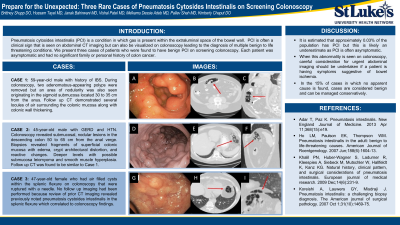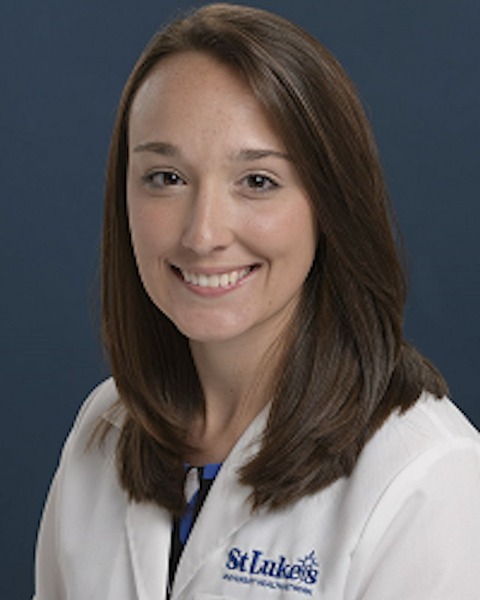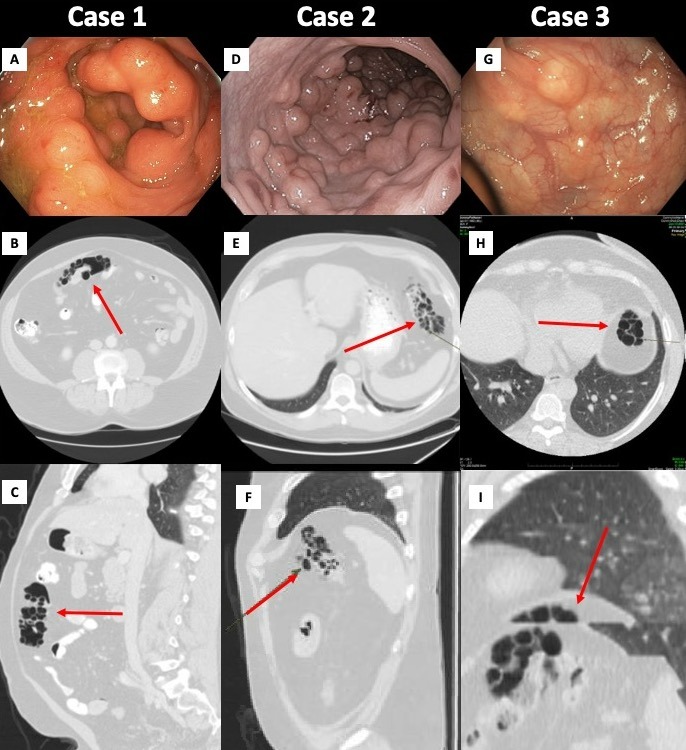Back


Poster Session D - Tuesday Morning
Category: Colon
D0117 - Prepare for the Unexpected: Three Rare Cases of Pneumatosis Cystoides Intestinalis on Screening Colonoscopy
Tuesday, October 25, 2022
10:00 AM – 12:00 PM ET
Location: Crown Ballroom

Has Audio

Brittney Shupp, DO
St. Luke's University Health Network
Bethlehem, PA
Presenting Author(s)
Brittney Shupp, DO1, Hussam Tayel, MD1, Janak Bahirwani, MD1, Melkamu Dessie Adeb, MD1, Pallav Shah, MD1, Vishal Patel, MD1, Kimberly Chaput, MD2
1St. Luke's University Health Network, Bethlehem, PA; 2St. Luke University Health Network, Bethleham, PA
Introduction: Pneumatosis cytosides intestinalis (PCI) is a condition in which gas is present within the extraluminal space of the bowel wall. PCI is often a clinical sign that is most commonly seen on abdominal Computed Tomography (CT) imaging but can also be visualized on colonoscopy leading to the diagnosis of multiple benign to life threatening conditions. We present three cases of patients who were found to have benign PCI on screening colonoscopy.
Case Description/Methods: Three patients presented for screening colonoscopy. Each patient was asymptomatic and had no significant family or personal history of colon cancer. In each endoscopic case, the cecum was reached and appeared normal. The first patient was a 59-year-old male with history of irritable bowel syndrome. During colonoscopy, two adenomatous-appearing polyps were removed but an area of nodularity was also seen originating in the sigmoid submucosa located 30 to 35 cm from the anus. Similarly, the second patient was a 45-year-old male with history of GERD and HTN whose colonoscopy also revealed large submucosal nodular lesions in the descending colon 50 to 65 cm from the anal verge. Biopsies taken during this colonoscopy resulted back as fragments of superficial colonic mucosa with marked edema, crypt architectural distortion, and reactive changes. Deeper levels also revealed possible submucosa leiomyoma and smooth muscle hyperplasia. In both cases, follow up CT demonstrated several locules of air surrounding the colonic mucosa along with colonic wall thickening. The third patient was a 47-year-old female with history of hyperlipidemia who had air filled cysts within the splenic flexure on colonoscopy that were ruptured with a needle. Review of the patient’s prior CT revealed several intramural locules of air in the splenic flexure, in keeping with pneumatosis cystoides intestinalis. For each of these patients, the CT findings were consistent with benign PCI with no evidence of obstruction or acute inflammatory changes and thus required no additional workup.
Discussion: It is estimated that approximately 0.03% of the population has PCI but this is likely an underestimate as PCI is often asymptomatic. When this abnormality is seen on colonoscopy, careful consideration for urgent abdominal imaging should be undertaken if a patient is having symptoms suggestive of bowel ischemia. In the 15% of cases in which no apparent cause is found, cases are considered benign and can be managed conservatively.

Disclosures:
Brittney Shupp, DO1, Hussam Tayel, MD1, Janak Bahirwani, MD1, Melkamu Dessie Adeb, MD1, Pallav Shah, MD1, Vishal Patel, MD1, Kimberly Chaput, MD2. D0117 - Prepare for the Unexpected: Three Rare Cases of Pneumatosis Cystoides Intestinalis on Screening Colonoscopy, ACG 2022 Annual Scientific Meeting Abstracts. Charlotte, NC: American College of Gastroenterology.
1St. Luke's University Health Network, Bethlehem, PA; 2St. Luke University Health Network, Bethleham, PA
Introduction: Pneumatosis cytosides intestinalis (PCI) is a condition in which gas is present within the extraluminal space of the bowel wall. PCI is often a clinical sign that is most commonly seen on abdominal Computed Tomography (CT) imaging but can also be visualized on colonoscopy leading to the diagnosis of multiple benign to life threatening conditions. We present three cases of patients who were found to have benign PCI on screening colonoscopy.
Case Description/Methods: Three patients presented for screening colonoscopy. Each patient was asymptomatic and had no significant family or personal history of colon cancer. In each endoscopic case, the cecum was reached and appeared normal. The first patient was a 59-year-old male with history of irritable bowel syndrome. During colonoscopy, two adenomatous-appearing polyps were removed but an area of nodularity was also seen originating in the sigmoid submucosa located 30 to 35 cm from the anus. Similarly, the second patient was a 45-year-old male with history of GERD and HTN whose colonoscopy also revealed large submucosal nodular lesions in the descending colon 50 to 65 cm from the anal verge. Biopsies taken during this colonoscopy resulted back as fragments of superficial colonic mucosa with marked edema, crypt architectural distortion, and reactive changes. Deeper levels also revealed possible submucosa leiomyoma and smooth muscle hyperplasia. In both cases, follow up CT demonstrated several locules of air surrounding the colonic mucosa along with colonic wall thickening. The third patient was a 47-year-old female with history of hyperlipidemia who had air filled cysts within the splenic flexure on colonoscopy that were ruptured with a needle. Review of the patient’s prior CT revealed several intramural locules of air in the splenic flexure, in keeping with pneumatosis cystoides intestinalis. For each of these patients, the CT findings were consistent with benign PCI with no evidence of obstruction or acute inflammatory changes and thus required no additional workup.
Discussion: It is estimated that approximately 0.03% of the population has PCI but this is likely an underestimate as PCI is often asymptomatic. When this abnormality is seen on colonoscopy, careful consideration for urgent abdominal imaging should be undertaken if a patient is having symptoms suggestive of bowel ischemia. In the 15% of cases in which no apparent cause is found, cases are considered benign and can be managed conservatively.

Figure: Image 1: (A) Case 1 colonoscopy revealing a large area of abnormal nodular mucosa in the sigmoid colon located approximately 35 to 30 cm from the anus and originating in the submucosa. (B,C) Follow up CT demonstrating a focal area of sigmoid colonic pneumatosis along with an adjacent focus of mesenteric venous gas. (D) Case 2 colonoscopy with submucosal nodular lesions in the descending colon 50 to 65 cm from the anal verge. (E, F) Follow up CT with several locules of air surrounding the colonic mucosa along with colonic wall thickening. (G) Case 3 with air fluid cysts on colonoscopy. (H, I) Prior CT coronary calcium screening incidentally noting Pneumatosis cytosides intestinalis.
Disclosures:
Brittney Shupp indicated no relevant financial relationships.
Hussam Tayel indicated no relevant financial relationships.
Janak Bahirwani indicated no relevant financial relationships.
Melkamu Dessie Adeb indicated no relevant financial relationships.
Pallav Shah indicated no relevant financial relationships.
Vishal Patel indicated no relevant financial relationships.
Kimberly Chaput indicated no relevant financial relationships.
Brittney Shupp, DO1, Hussam Tayel, MD1, Janak Bahirwani, MD1, Melkamu Dessie Adeb, MD1, Pallav Shah, MD1, Vishal Patel, MD1, Kimberly Chaput, MD2. D0117 - Prepare for the Unexpected: Three Rare Cases of Pneumatosis Cystoides Intestinalis on Screening Colonoscopy, ACG 2022 Annual Scientific Meeting Abstracts. Charlotte, NC: American College of Gastroenterology.
